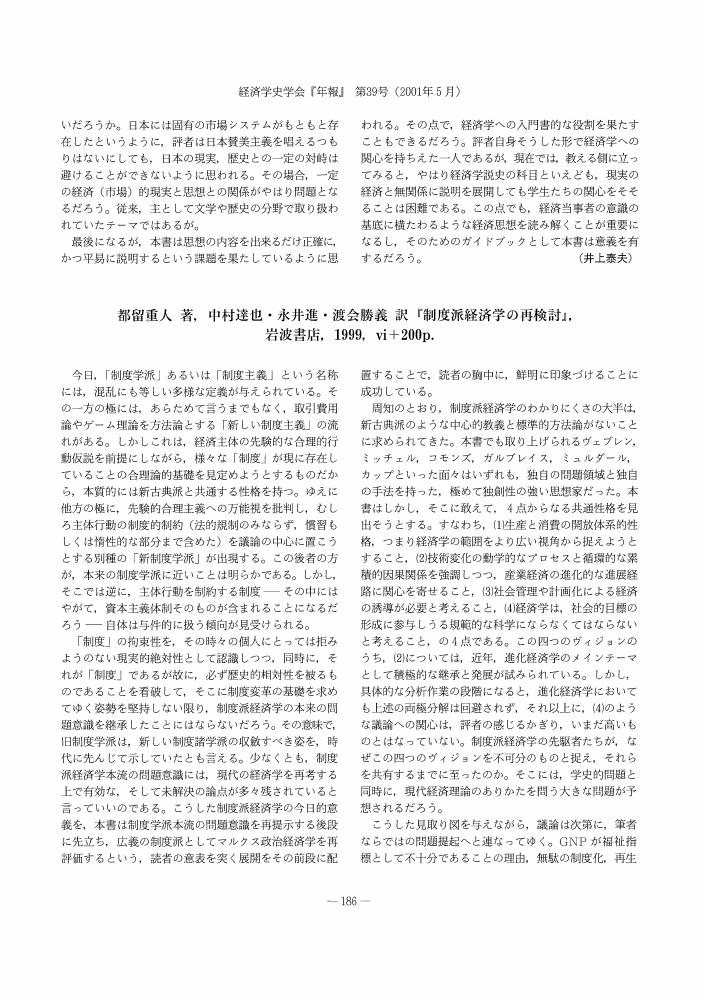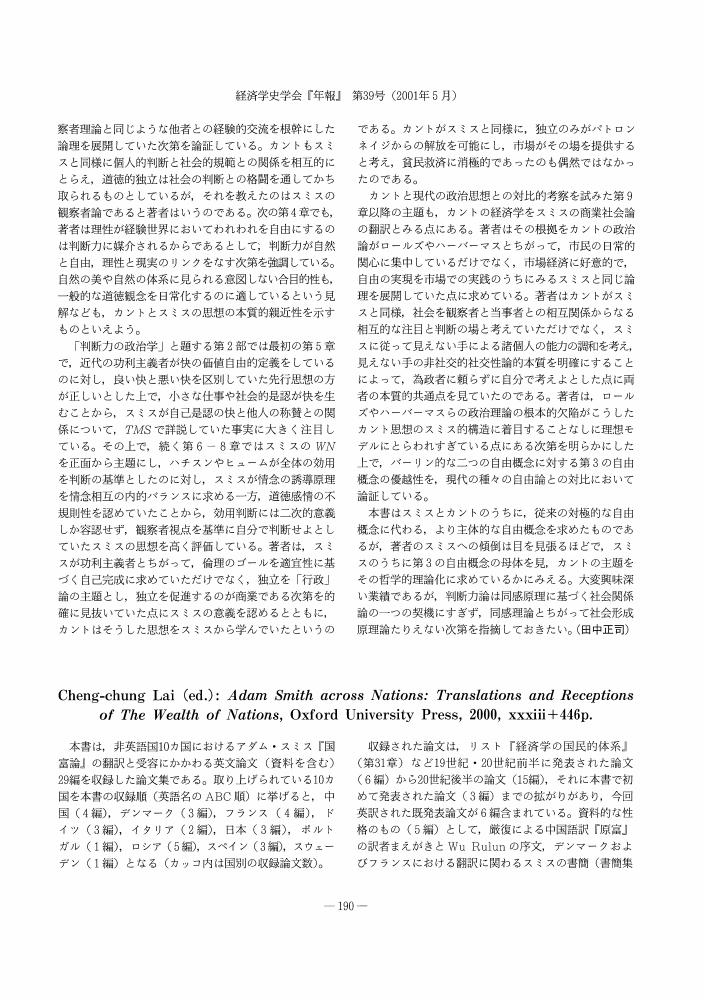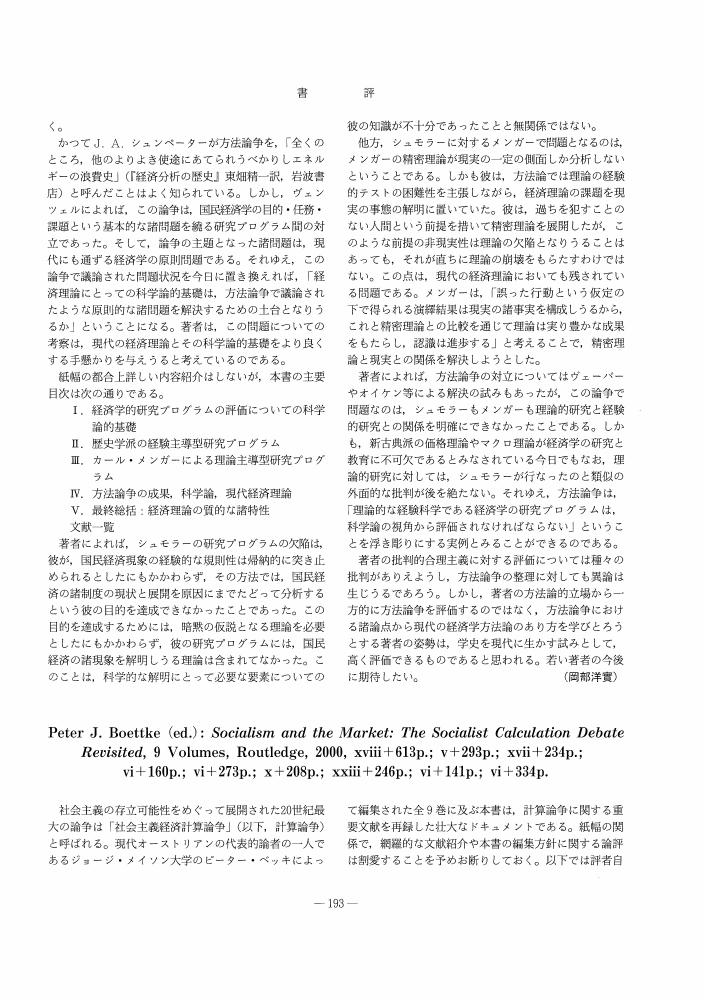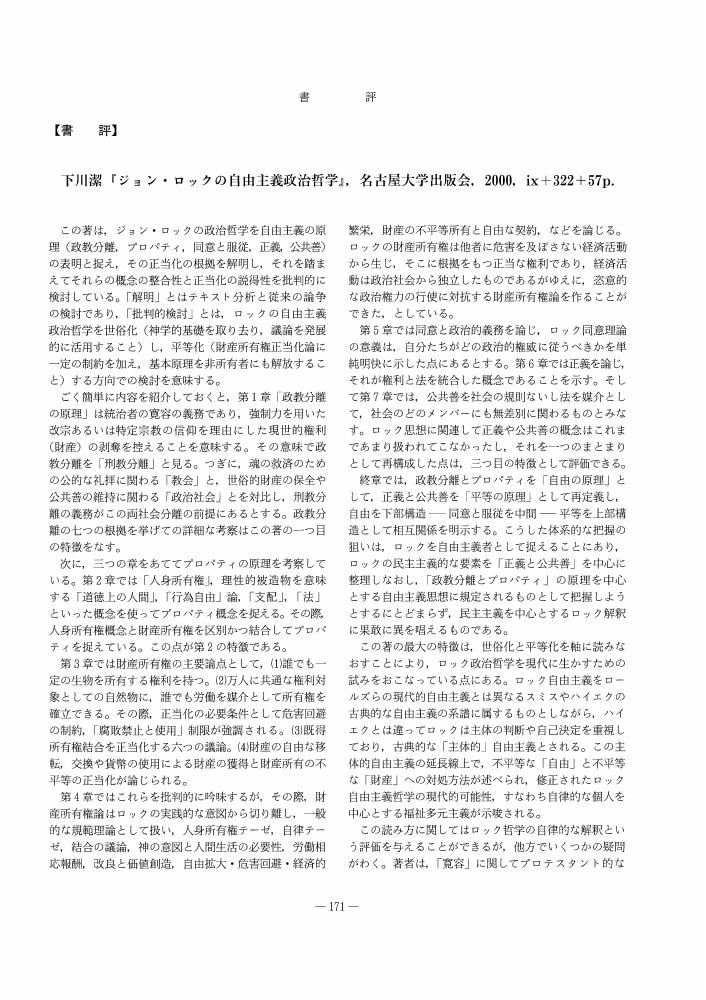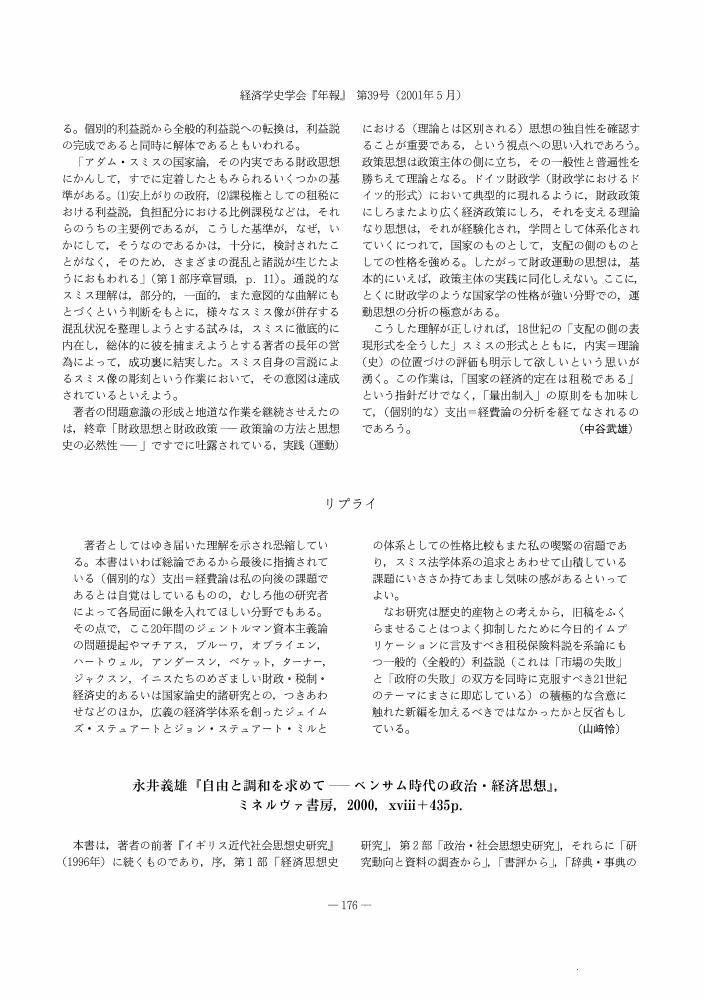- 著者
- 井上 義朗 都留 重人
- 出版者
- 経済学史学会
- 雑誌
- 経済学史学会年報 (ISSN:04534786)
- 巻号頁・発行日
- vol.39, no.39, pp.186-188, 2001 (Released:2010-08-05)
1 0 0 0 OA 経済学史学会編『経済思想史辞典』, 丸善, 2000, vi+497p.
- 著者
- 尾近 裕幸
- 出版者
- 経済学史学会
- 雑誌
- 経済学史学会年報 (ISSN:04534786)
- 巻号頁・発行日
- vol.39, no.39, pp.188-189, 2001 (Released:2010-08-05)
- 著者
- 田中 正司
- 出版者
- The Japanese Society for the History of Economic Thought
- 雑誌
- 経済学史学会年報 (ISSN:04534786)
- 巻号頁・発行日
- vol.39, no.39, pp.189-190, 2001 (Released:2010-08-05)
- 著者
- 武者小路 信和
- 出版者
- The Japanese Society for the History of Economic Thought
- 雑誌
- 経済学史学会年報 (ISSN:04534786)
- 巻号頁・発行日
- vol.39, no.39, pp.190-191, 2001 (Released:2010-08-05)
- 著者
- 姫野 順一
- 出版者
- The Japanese Society for the History of Economic Thought
- 雑誌
- 経済学史学会年報 (ISSN:04534786)
- 巻号頁・発行日
- vol.39, no.39, pp.191-192, 2001 (Released:2010-08-05)
- 著者
- 岡部 洋實
- 出版者
- The Japanese Society for the History of Economic Thought
- 雑誌
- 経済学史学会年報 (ISSN:04534786)
- 巻号頁・発行日
- vol.39, no.39, pp.192-193, 2001 (Released:2010-08-05)
- 著者
- 塚本 恭章
- 出版者
- The Japanese Society for the History of Economic Thought
- 雑誌
- 経済学史学会年報 (ISSN:04534786)
- 巻号頁・発行日
- vol.39, no.39, pp.193-195, 2001 (Released:2010-08-05)
1 0 0 0 OA カール・ポランニーの「二重運動」と自由
- 著者
- 若森 みどり
- 出版者
- The Japanese Society for the History of Economic Thought
- 雑誌
- 経済学史学会年報 (ISSN:04534786)
- 巻号頁・発行日
- vol.39, no.39, pp.146-158, 2001 (Released:2010-08-05)
- 参考文献数
- 26
As did his many contemporary thinkers Karl Polanyi (1886-1964), in the last chapter of his The Great Transformation under the title of “Freedom in a Complex Society, ” dealt with the problem of freedom. In the keen distinction from the ordinal interpretation that the tendency “from laissez-faire to state intervention” or “from individualism to collectivism” directly led to Fascism, Polanyi described the institutional or historical origins of that crisis in the light of his “double movement” interpretation of the nineteenth century industrial society.According to him, the problem of freedom in his time arose on two levels: the institutional and the moral or religious. How is the “free society” reorganized? On the institutional level, Polanyi suggested that the improvement of industrial conditions and employment through the support of planning and control were important. On the moral and religious level, a new view of freedom was needed. It was in this regard that Polanyi respected Robert Owen, because Owen not only rejected the identification of freedom with the mere liberation of profit motives or with “individualization”, but favored the reconstruction of humanity and freedom in the form of “society as a whole”.
- 著者
- 岡村 東洋光 下川 潔
- 出版者
- 経済学史学会
- 雑誌
- 経済学史学会年報 (ISSN:04534786)
- 巻号頁・発行日
- vol.39, no.39, pp.171-173, 2001 (Released:2010-08-05)
- 著者
- 只腰 親和 伊藤 哲
- 出版者
- 経済学史学会
- 雑誌
- 経済学史学会年報 (ISSN:04534786)
- 巻号頁・発行日
- vol.39, no.39, pp.173-174, 2001 (Released:2010-08-05)
- 著者
- 中谷 武雄 山崎 怜
- 出版者
- 経済学史学会
- 雑誌
- 経済学史学会年報 (ISSN:04534786)
- 巻号頁・発行日
- vol.39, no.39, pp.175-176, 2001 (Released:2010-08-05)
- 著者
- 音無 通宏
- 出版者
- 経済学史学会
- 雑誌
- 経済学史学会年報 (ISSN:04534786)
- 巻号頁・発行日
- vol.39, no.39, pp.176-178, 2001 (Released:2010-08-05)
1 0 0 0 OA P. スラッファ編『リカードウ全集』, 全11巻, 雄松堂, 1969-1999
- 著者
- 中村 廣治
- 出版者
- 経済学史学会
- 雑誌
- 経済学史学会年報 (ISSN:04534786)
- 巻号頁・発行日
- vol.39, no.39, pp.178-179, 2001 (Released:2010-08-05)
- 著者
- 渡会 勝義 中矢 俊博
- 出版者
- 経済学史学会
- 雑誌
- 経済学史学会年報 (ISSN:04534786)
- 巻号頁・発行日
- vol.39, no.39, pp.179-181, 2001 (Released:2010-08-05)
1 0 0 0 OA マーシャルとケンブリッジ学派
- 著者
- 橋本 昭一
- 出版者
- The Japanese Society for the History of Economic Thought
- 雑誌
- 経済学史学会年報 (ISSN:04534786)
- 巻号頁・発行日
- vol.39, no.39, pp.66-73, 2001 (Released:2010-08-05)
- 参考文献数
- 42
Marshall's theoretical and educational efforts and success in the field of economics was already highly appreciated even in his day. Nevertheless, it is a curious fact that almost all of his students and disciples at Cambridge or at other institutions have gradually hesitated to follow the lines he indicated. This is one of the reasons why he was called a ‘soaring eagle’ or ‘enigma’. In order to not only reassess Marshall's economic thought, but also to elucidate his attitude foward contemporary economists and their methodology, much important material has been published in the last decade, namely by Whitaker (1990), Raffaelli (1990), Groenewegen (1995), Raffaelli (1995), Whitaker (1996), Groenewegen (1997), Groenewegen (1998). These works consist of a new bulky biography, collected works of 8 volumes, more than a thousand items of correspondence, a collection of ‘unknown voices’ in response to Marshall's economics, critical essays, and Marshall's unpublished lectures. Also very beneficial for Marshall scholarship are materials such as The collected Works of Sidgwick (1996) and Fawcett (1995). In the beginning of the new century, we can start to analyze such questions as ‘Is Marshall a communitarian or a libertarian in his circle?’ In this case, we should like to include Sidgwick and Fawcett in the Cambridge Circle.
1 0 0 0 OA ケインズ研究の動向
- 著者
- 平井 俊顕
- 出版者
- The Japanese Society for the History of Economic Thought
- 雑誌
- 経済学史学会年報 (ISSN:04534786)
- 巻号頁・発行日
- vol.39, no.39, pp.74-80, 2001 (Released:2010-08-05)
- 参考文献数
- 53
The purpose of this paper is to survey recent studies of Keynes's theory which deal with A Treatise on Money and The General Theory. In Section 1, studies of A Treatise on Money are discussed in view of (i) the determination of price and output, (ii) monetary theory, and (iii) its relation to Wicksellian theories. In Section 2, studies of Keynes's theoretical development between the two books are examined. In Section 3, studies of The General Theory, mainly by post-Keynesians and neo-Ricardians, and partially by Income-Expenditure Keynesians are discussed. And in Section 4, studies of the relation between the two books are examined in terms of discontinuity and continuity.
1 0 0 0 OA 「近代経済学史」研究の成果と課題
- 著者
- 井上 琢智
- 出版者
- The Japanese Society for the History of Economic Thought
- 雑誌
- 経済学史学会年報 (ISSN:04534786)
- 巻号頁・発行日
- vol.39, no.39, pp.81-85, 2001 (Released:2010-08-05)
The reseach into the history of Modern Economics which is understood to be economics on the principle of diminishing marginal utility and non-Marxian economics in Japan, began in the the 1960s, but these studies were few in comparison to the those concerning Classical Ecomomics. From 1970 onwards, conferences and the societies commemorated W. S. Jevons, C. Menger, L. Walras, A. Marshall, and J. A. Shumpeter, and their collected works were edited and published. Then in the 1980s and after, young Japanese scholars were encouraged to study and publish articles and books in English, German, and French, some of which are highly esteemed at home and abroad. By the 1990s the level of the study of Modern Economics in Japan was the same as that of research regarding Classical Economics.From the 1960s to the 1990s, the themes changed. In the 1960s some scholars became interested in the theories of Marshall and Keynes, and a few of them wrote articles on the theories and methodologies of Menger, Walras, V. Pareto, J. A. Schumpeter, etc. But after the 1970s, articles were written primarily on the theories and thought of Walras and Menger as well as Marshall, Keynes, Jevons. And further, we greatly widened our horizons and made an effort to treat the entire body of thought of each economist. Now we must study their epistemologies and scientific methods underlying their economics and thought. If we don't, we cannot understand the true meaning of the “general” in Keynes' The General Theory of Employment, Interest and Money.
- 著者
- 八木 紀一郎
- 出版者
- The Japanese Society for the History of Economic Thought
- 雑誌
- 経済学史学会年報 (ISSN:04534786)
- 巻号頁・発行日
- vol.39, no.39, pp.86-93, 2001 (Released:2010-08-05)
- 参考文献数
- 36
Historical research into Austrian economics was encouraged by two conferences in 1971 (Bellagio and Vienna) and one in 1989 (Durham, NC). Grounded on a thorough archival investigation, study of Carl Menger and Böhm-Bawerk has made a remarkable progress. Although study of Wieser is rare, we now have a good understanding of founding fathers of the Austrian school in the intellectual traditions of the Germanspeaking world. However, the theoretical research in this area shows a lag. A new general view of Austrians is still to come. One of the problems involved in this field of study is whether, Austrian' school is a branch of neo-classicism or not. In the last part of the survey, the author poses the question about the vision that guides historical reseach regarding the Austrians. His tentative answer is that a historical researcher need not adopt the same view as those of the economists he studies. The author suggests that an ‘evolutionary’ view might offer a better framework for the research than the ‘Austrian’ view could offer.
1 0 0 0 OA History of Japanese Economic Thought
- 著者
- 池尾 愛子
- 出版者
- The Japanese Society for the History of Economic Thought
- 雑誌
- 経済学史学会年報 (ISSN:04534786)
- 巻号頁・発行日
- vol.39, no.39, pp.94-102, 2001 (Released:2010-08-05)
- 参考文献数
- 29
There are several groups of scholars, both non-Japanese and Japanese, pursuing historical studies of Japanese economic thought. There have been significant societal activities such as nationwide meetings organized by the Society for the History of Japanese Economic Thought and publications both in English and in Japanese on the history of Japanese economic thought by the Japanese Society for the History of Economic Thought. Frequently discussed topics are the economic ideas in the closeddoor period, Japanese enlightenment and modernization, the introduction of Western economics into Japan, Japanese contributions to economics, and the internationalization of economics. Japan has a rich history of economic thought cultivated in Japan from the Tokugawa period to the present. Unfortunately the research results are scattered in various academic journals, commercial magazines, and university organs. Therefore, books and monographs are a powerful medium in this field. The creation of a single forum, ideally electronic, for scholarly communication is most urgently needed in order to inform the general population, including economists, of the serious research results regarding this subject. One of the important goals that Japanese scholars should attempt is to produce research results in English even if they lose something in translation.
1 0 0 0 OA 1840年代のアメリカにおけるフーリエ主義の受容
- 著者
- 石塚 幸太郎
- 出版者
- The Japanese Society for the History of Economic Thought
- 雑誌
- 経済学史学会年報 (ISSN:04534786)
- 巻号頁・発行日
- vol.39, no.39, pp.103-115, 2001 (Released:2010-08-05)
- 参考文献数
- 3
The ideas of Charles Fourier were imported into 1840's America by Albert Brisbane. Fourier's ideas, some of which seemed eccentric and extravagant to Brisbane, were abridged and adapted to the context of American society. Brisbane claimed that the building of a new community “Association” would be the best solution to all social problems of that time. In his plan, about 1800 people would live together cooperatively in a labor system called “attractive industry” which promised high productivity. An “Association” would be a community in which each member would hold stock certificates as personal property.In the Jacksonian era, chartered business corporations were attacked for their privileges. However, in the course of deliberating the general incorporation act some economists including Henry Carey, argued in their favor. They thought that business corporations supported by small shareholders would provide an oppotunity for poor people to become independent and reasonably wealthy.Brisbane argued that his Association was based on the operating style of current business corporations. In addition, he pointed out that this shared property system would harmonize diverse interests of members, interests which had up until then been the source of ruinous conflicts.Brisbane presented his Associaton, which was based on a joint stock property system originally found in the business world, as the best means of social reform.
